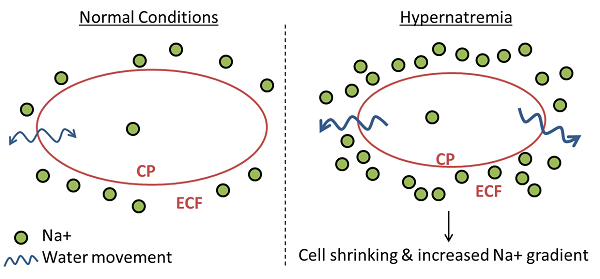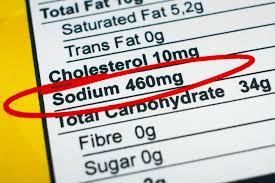Hypernatremia, characterized by an abnormally high concentration of sodium in the blood., presents various hypernatremia signs and symptoms that can impact health. These signs and symptoms arise because sodium is an essential electrolyte that plays a crucial role. It maintainins fluid balance, nerve function, and muscle contraction. This condition occurs when there is either an excessive loss of water from the body or excessive sodium intake without adequate water replacement, leading to a higher concentration of sodium in the bloodstream compared to the normal range.
Sodium is the main positive charged ion (cation) in extracellular fluid. Osmosis, the movement of water molecules through a cell’s partially permeable membrane is driven by the concentration gradient between solutions. Due to an excessive of sodium in extracellular fluid, cells lose water to the extracellular area. This causes hypertonic dehydration, a state where the solute concentration inside cells is lower than in the surrounding fluid.
The primary cause of hypernatremia is water loss, either through inadequate water intake, excessive water losses through the skin and urine, or a combination of both. Without sufficient water to dilute it, sodium concentration rises in the blood. Signs of hypernatremia include intense thirst and ry mucous membranes due to cellular deydration, neurological changes like lethargy, restlessness, and coma as brain cells shrink, and decreased skin turgor and elasticity as cells lose water.
The brain and kidneys are the two organs most impacted by hypernatremia. Severe hypernatremia causes cellular dehydration in the brain, leading to potentially life-threatening conditions likecerebral edema, permanent brain damage, cerebrovascular. The kidneys initially respond to high sodium levels by excreting more sodium in the urine. This lower blood concentration and conserves water by producing concentrated urine..
Hypernatremia Signs and Symptoms
Common symptoms of hypernatremia include intense thirst, headache, nausea or vomiting, dizziness or lightheadedness, and fatigue or weakness. Individuals at highest risk are the elderly, infants, or those with impaired thirst mechanisms, as they may not be able to obtain enough water to match their sodium and water losses.

Correcting hypernatremia involves replenishing fluids and restoring the proper sodium-water balance n the body. In mild cases, increasing water intake and adjusting dietary sodium many be sufficient. However, in more severe cases, medical attention and intravenous fluid replacement under close medical supervision may be necessary.
Hypernatremia can also contribute to high blood pressure. As the condition stimulates thirst, the body releases antidiuretic hormones (ADH), elevating blood pressure. Additionally, certain medications, such as those contributing to diabetes insipidus ( a condition characterized by an uncontrolled desire to drink fluids) or corticosteroids like predinose, may impair the kidney’s ability to concentrate urine, leading to excessive water loss and hypernatremia.
Metabolic Panel Testing
Doctors typiically order testing of serum sodium levels with a blood sample, either through a basic metabolic panel or a complete metabolic panel, to diagnose hypernatremia. These tests measure the amount of sodium present in the liquid portion of the blood (serum). While drinking water can help resolve mild cases by providing free water to dilute the plasma sodium concentration, sever hypernatremia may require intravenous fluids.
Remember, the information provided is for educational purposes, only, and should not be taken as medical advice. Please consult with your healthcare provider for personalized guidance.
Barry Schustermann
Follow me on X @ BarrySchust
Follow me on Facebook @Barry Schustermann



